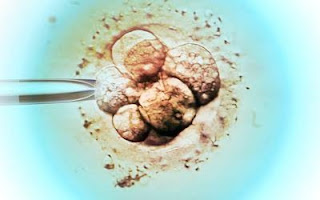In vitro fertilisation IVF scientists have discovered that embryos created with sperm from men over the age of 50 divide more slowly and take longer to reach the early stage known as a blastocyst, when the embryo is ready to be implanted in the womb.
Embryos created with sperm from men over 50 years developed 35 per cent more slowly than embryos created with sperm from men under 35. Considering only embryos that reached the blastocyst stage, the time to reach this point was 4.3 per cent slower for the embryos of men over 50 years than for the embryos of men under 35.
As men age, their sperm becomes more prone to develop mutations that result in DNA errors. Sperm from older men was found to have an abnormal number of chromosomes in each cell – either too many or too few, a condition called aneuploidy. This will prevents the sperm from creating a healthy embryo.
The team analysed the DNA of sperm from men whose partners were experiencing recurring pregnancy loss.
The men were divided into seven age groups, with the youngest group aged 25 to 30 and the oldest over 55. Their sperm was tested for aneuploidy and DNA sequencing for a type of mutation called copy number variation CNV.
Both types of defects were highest in the oldest age group. Fertilisation rate was 87.7 per cent in the youngest age group and declined to 46 per cent in the oldest group. Age can increase the risks of poor pregnancy outcomes and the potential for neurodevelopmental problems in offspring.
haleplushearty.blogspot.com



